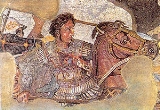
. By the age of thirty, he had created one of the largest empires of the ancient world
, stretching from the Ionian Sea
to the Himalayas
. He was undefeated in battle, and is considered one of history's most successful commanders. Born in Pella
in 356 BC, Alexander was tutored by Aristotle
until the age of 16.
Alexander succeeded his father, Philip II of Macedon
, to the throne in 336 BC after Philip was assassinated.
356 BC Alexander is born in Born in Pella, Macedon.
336 BC Alexander becomes ruler of Macedonia after the murder of his father Philip.
335 BC Alexander defeats the Triballians at the Battle of Lyginus.
333 BC Alexander solves the riddle of the Gordian knot in Gordium.
333 BC Alexander defeauts Darius III of Persia in the Battle of Granicus and captures the Persian royal family.
332 BC Alexander beseiges the island of Tyre.
332 BC Alexander is crowned Pharoh of Egypt in Memphis, Egypt.
331 BC Alexander founds the city of Alexandria, Egypt.
331 BC Alexander visits the oracle of Siwa who informs him that he is the son of Zeus and therefore a God.
330 BC After looting the treasures of the Persian capital city of Persepolis, Alexander and his men burn its famous palace and the surrounding city to the ground.
What an excellent horse do they lose, for want of address and boldness to manage him! ... I could manage this horse better than others do.![]()
If I were not Alexander, I should wish to be Diogenes of Sinope|Diogenes.![]()
I do not steal victory.![]()
Youths of the Pellaians and of the Macedonians and of the Hellenic Amphictiony and of the Lakedaimonians and of the Corinthians… and of all the Hellenic peoples, join your fellow-soldiers and entrust yourselves to me, so that we can move against the barbarians and liberate ourselves from the Persian bondage, for as Greeks we should not be slaves to barbarians.![]()
Now you fear punishment and beg for your lives, so I will let you free, if not for any other reason so that you can see the difference between a Greek king and a barbarian tyrant, so do not expect to suffer any harm from me. A king does not kill messengers.![]()

